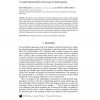Free Online Productivity Tools
i2Speak
i2Symbol
i2OCR
iTex2Img
iWeb2Print
iWeb2Shot
i2Type
iPdf2Split
iPdf2Merge
i2Bopomofo
i2Arabic
i2Style
i2Image
i2PDF
iLatex2Rtf
Sci2ools
117
click to vote
JOLLI
2006
2006
A Modal Interpretation of the Logic of Interrogation
We propose a novel interpretation of natural-language questions using a modal predicate logic of knowledge. Our approach brings standard model-theoretic and proof-theoretic techniques from modal logic to bear on questions. Using the former, we show that our interpretation preserves Groenendijk and Stokhof's answerhood relation, yet allows an extensional interpretation. Using the latter, we get a sound and complete proof procedure for the logic for free. Our approach is more expressive; for example, it easily treats complex questions with operators that scope over questions. We suggest a semantic criterion that restricts what natural-language questions can express. We integrate and generalize much previous work on the semantics of questions, including Beck and Sharvit's families of subquestions, non-exhaustive questions, and multi-party conversations.
Related Content
| Added | 13 Dec 2010 |
| Updated | 13 Dec 2010 |
| Type | Journal |
| Year | 2006 |
| Where | JOLLI |
| Authors | Rani Nelken, Chung-chieh Shan |
Comments (0)

